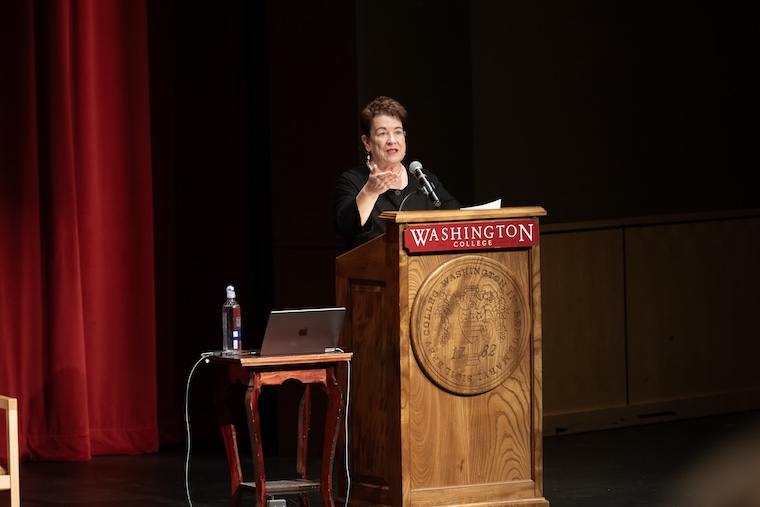Molly Smith talks theater, community-building
Artistic director from Washington, D.C.’s Arena Stage shared stories from her career and answered students’ questions at campus event.

Surround yourself with people who believe in you. Bring your artist friends—writers, actors, directors—together for a table reading. Build your audience and listen to what they want to see. Speak about the moment.
That was the advice Molly Smith gave attendees, many of them Washington College students, at her talk and question-and-answer session Wednesday evening, Jan. 31, in Decker Theater. Smith was the artistic director at Arena Stage at the Mead Center for American Theater in Washington, D.C., for 25 years before retiring in 2023.
Most of Smith’s talk focused on her career at Arena, where she commissioned dozens of new plays, created a new theater space, and searched for D.C.’s voice by staging political plays. During her tenure, Smith shifted the theater’s focus to American artists, ideas, and stories, producing work by established and emerging writers. She modernized plays through casting, interpretation, and approved line changes; promoting women writers and diversity; and providing living wages and benefits for writers-in-residence.
“I’ve always had great admiration and respect for the work Smith did at Arena Stage. It was smart but also courageous to commit to focusing on American plays and playwrights.”
— Professor Dale Daigle, director of the Daniel Z. Gibson Center for the Arts, who organized Smith’s visit
“American theater means tackling big ideas,” Smith said Wednesday. “We live in a world of multiple experiences, races, genders, religions, cultures, and more. I want my work to reflect that world and allow it to illuminate the material.”
Commissioning new works is a “radical act” in the theater, Smith said, because it takes a risk in the hopes that “a great new play will be birthed.”
“Follow the artist because the artist always knows where they’re going. You can support, you can nudge, you can give them inspiration, but it’s their job to write what is within them,” she said.
Smith told stories of working on new plays, with different writers, and on cutting-edge projects. She said she knew she was seeing something important when the hair on the back of her neck stood up, which comes from experience and can’t be taught.
She spoke about working with writers at various points in their projects, from commissioning ideas to workshopping and editing so they are in their best form to tell the story.
“To have a great theater, you need great artists, and great writers. And I tell you what else, you need a great audience. If you don’t have a great audience, you have nothing,” Smith said.
During the question-and-answer portion, one attendee said there has been a loss of investment in the individual artist and asked how people in the arts can convince political and philanthropic leaders to shift money back to the artist.
“America is an innovative powerhouse,” Smith said. It needs to be able to promote new ideas and the arts in more provocative ways. “Our greatest gift in the theater is free speech and our imagination, because no one can take our imagination away from us.”
She added that she thinks a shift back into investing in the arts is on the horizon as people see the impact of more of these institutions going away.
One student said that she had recently found her spark in the theater and asked Smith how to continue to cultivate it.
Creative individuals must surround themselves with others who will support them, Smith said. When she was a child Smith’s mother told her that when she found what she loved, no one would be able to stop her. “You need to find people who support you and love you and tell you (that) you can do anything. Get rid of the naysayers, get rid of the people who don’t support you.”
But not every project or artist succeeds in the industry. Smith said it was just as important to dissect successes to see how they were achieved as it is to dissect failures.
Despite failures, “regret is not an option. It’s always ‘what’s next,’” Smith said, and recognizing the opportunities walking through the door.
“If you have friends who are writers, as directors, say to them, ‘I’ll put together actors, we can get together and hear your work.’ Start building those collaborations now, because these are the people that will sustain you 20 years from now,” she said. “Believe in the project so much that everyone follows you to the ends of the earth.”
— MacKenzie Brady '21